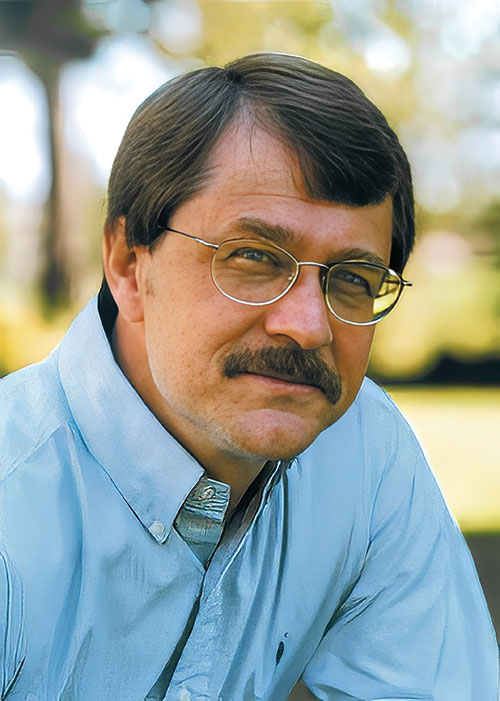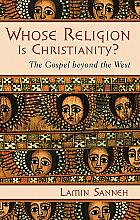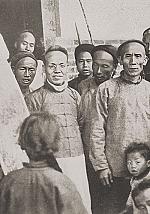The moving cloud of God’s presence

[Headshot—Courtesy of George Otis]
How do Christians align with God in the work of revival? CH spoke with George Otis Jr., author, producer, and founder and president of the Sentinel Group, a Seattle-based Christian organization dedicated to helping revival-hungry communities to that end.
CHRISTIAN HISTORY: You’ve devoted yourself in this last quarter-century to the study of revival, investigating and documenting spiritual movements around the world. What drives you in this work?
GEORGE OTIS: I desire to understand why the moving cloud of God’s presence hovers where it does. Why are certain communities experiencing what I would call transforming revival—some of them quite extensively, while other areas, including areas that are well churched—are not? We began to document some of these things on film starting in 1998 and have been monitoring over 800 communities globally. We have actually filmed a number of them and released multiple documentaries.
CH: Is there any revival in recent times that was particularly memorable?
GO: They’re all utterly magnificent. They’re all the handiwork of God, and they’re precious, powerful, and impactful. There are at least a half a dozen that I’d really like to talk about, but I think one of the interesting places has been the Fiji Islands in the South Pacific.
People from Australia began to take some of our early revival documentaries over to Fiji, which fell on receptive soil. Fiji at that time was struggling in many respects, economically, ecologically, and socially, but the people began to humble themselves and follow the script of 2 Chronicles 7:14, humbling themselves and confessing their sin.
When I talk about confession of sin, I mean these communities would spend a good three months preparing themselves for this time of individual and corporate repentance. It was very thorough, authentic, and heartfelt. Often when we’re talking about revival and needing awakening, we’re looking outwardly at things that are dysfunctional or broken in the community at large, and we’d like to see those things repaired or remedied. But God doesn’t tend to work that way. He wants to focus us inwardly on our own personal need for revival and transformation. When you are transformed, as an individual in your broken community, then the corporate expression has begun. You’ve established a beachhead for God’s work in that community. So that was happening in Fiji, in many different communities in multiple island groups, and it was happening at the highest levels of government as well.
Fiji right now has quite a record. They formed what they called the “healing the land” team, made up of young people who left their villages as first fruit offerings to the Lord for what he had done for them. These young people from different communities would live together, do Bible study and pray together, and then move out to other communities that hadn’t been visited by revival yet but wanted to be. They would live with the people in those communities until a breakthrough happened there as well. And then they began to head overseas. I’ve run into these people all the way up in the Canadian Arctic. They’ve gone to Brazil, to Malaysia, to Malawi—all over—giving away the overflow of what God has given to them. If you visit these communities today, you’ll find monuments saying, “On this particular day, we the people of this community humbled ourselves before Almighty God. We repented of our sin. And on this day, he visited us.” It’s like Joshua’s memory stones on the other side of the Jordan. You can find many of these in Fijian communities today.
CH: Are there any phases that you generally see in revivals?
GO: I see three phases. Invitation, which leads to visitation in some form. That then leads to transformation, where the systems of human culture and community are changed.
The invitation phase is about the humbling of individuals in the community, the confession of sin, repentance, and moving into individual and corporate prayer. This lasts varying lengths of time, depending on what needs to be dealt with. Obviously a big part of this is aligning the focus of our prayers with the purposes of God, inviting him into our lives. Of course we have to humbly spend time in his presence waiting upon him, hearing and feeling what’s there, and then beginning to pray accordingly.
The visitation phase is the most unpredictable. It doesn’t last very long, and historically this has been the case as well. Usually it’s two to three years and sometimes less than that. God knows these communities better than anybody. He knows their history; he knows the specific nuances about what’s going on in the hearts and spirits of those who are petitioning him. So he prepares the perfect entrance that’s tailor-made for that particular group of people. When his transforming power is manifest and released and things start changing in many arenas of human life, then that period of God’s visitation begins to subside.
In the third phase, transformation, God says to his people, “It’s important for you to extend this blessed condition that I have brought about by my will and power and compassion. You need to keep your eyes focused on me. And I will mentor you. I will show you how you can do this through new business practices, new educational curricula, and new legal statutes and laws. I will show you how to do that so that the Kingdom values that are now manifest in the community have legs, so they can last longer.”
In our research we have found that this phase is open-ended. It can continue presumably indefinitely if people keep their eyes focused on the Lord and are walking in obedience. But in far too many cases, these moves of God end prematurely. So it’s really important not just to ask “How did these things start?,” but also “Why did they end so soon?”
CH: You often report on how revival has an effect on the environment. What have you seen?
GO: The people of Fiji have a concept. There’s actually a word in the Fijian language that means “the people in the land.” It refers to a deep, meaningful relationship between the well-being of the stewards of the land and the health of the land itself. When the stewards of the land are not healthy, the land will not be healthy.
Many of these communities and their lands had many problems before the repentance took place. But when the presence of the Lord came down, they saw quite dramatic changes to the ecosystem in these locations. Some of them were inland communities up in the mountains. Some of them were coastal communities where the reefs had died, along with the fish they had depended on for some time. The stories were abundant about how instantly—I mean overnight—these things were restored on islands where nothing was growing. All of a sudden these trees that were not bearing became heavily laden with citrus, mangos, and other fruits.
On one island where we filmed, the people had lived off of big crabs, but the reef had died and the crabs had disappeared. But the people were going through a season of repentance, and one day, while most of the community was in church, they heard yelling outside. Some of them went out and saw women who had been out on the reef with nets trying to catch even some little fingerlings so they could provide a meal to their family, and they were clearly in distress and struggling. So the men went out in boats, and found these women—sort of like the disciples struggling to pull in nets that were teeming with fish. They had to call for other boats from shore, and they filled them up. And then all of these crabs, hundreds of them, big fully mature crabs, started walking out of the sea up onto the beach, and the people were simply collecting them and putting them in baskets.
As a researcher I know I can’t report these things on the basis of a single testimony. I need to corroborate them in different ways. But in these cases, the whole community was telling the story, and one would fill in certain details and then another, and they would be weeping and sometimes in spontaneous worship and singing, even as they were trying to get out the report. So the credibility level was very, very high. We are now tracking about 250 separate stories like this in the Fiji Islands alone.
One community was just about ready to go out of existence. The food was gone. Feral pigs were eating their yams. The fish were gone. The reef was dead. Nothing they planted would grow.
There had also been a lot of idolatry going on there. And they were losing their youth to many untimely deaths. It was dark. People were walking around in fear. But the church had just finished a time of repentance, and the Lord had said to some of the elders that he would speak to them “through fire.” Of course they’re thinking, you know, metaphorically. But one morning people suddenly saw a light in the sky. It was daytime, and not cloudy, so the hot tropical sun was in the sky. But this light they saw was so bright it made the sun seem like a spark.
It was moving too, descending toward the community. “We not only saw it,” they said, “we felt it.” All over the community, people were falling to their knees and putting their faces on the ground. Little children were hiding behind their mothers. All of a sudden the sea caught on fire. Over the reef a wall of flames rose about 90 feet high, and it went for half a mile down the coast. People were fearful about this. Finally after some time had passed and the fire left, they got up on very unsteady legs and moved very slowly down to the beach. The water was boiling.
So they thought, Don’t touch it, it’s too hot. But as they looked closer, they realized it had nothing to do with temperature. It was thousands and thousands of fish they had not seen for decades—so plentiful that everyone in the village, from old men to mothers to children, were gathering cardboard boxes or plastic buckets, fishing lines and nets, and bringing them in, way more than they could use. This started happening day after day, and they started to take the excess to neighboring villages. In this way, the move of God spread to eight different communities. The feral pigs were never seen again. The people planted crops that were turning over in as little as 15 days. Churches of different denominations experienced renewal and healing, with people working together like never before. I’ve actually been on a boat there with a marine biologist who said, “We’ve seen things happening here in these waters that we haven’t seen anywhere else in the world.”
CH: Your first Transformation video focused on the movement of God in Cali, Colombia, beginning in 1995. Do you have any follow-up on Cali?
GO: We went back down to Colombia and filmed an update. The move of God had spread widely. In one area many of the communities had become 100 percent Christian. There was another area—the central mountain range, where villagers were growing coca (cocaine) for either the paramilitaries or the cartels—but God began to move. It was a spillover from what he had done in Cali. They became convicted that what they were doing was wrong, and so they humbled themselves, they confessed their sin, they repented. Then they went and told the people they were working for that they weren’t going to grow coca anymore, which was an incredibly dangerous thing to do. They knew this and they did it anyway. But the people they were growing for recognized the hand of God, and they allowed these people to completely walk away, to begin to grow other crops. So they started growing coffee, mangos, cotton—and everything that they grew just prospered. The favor of God was upon them. All of these communities renamed themselves after biblical places, so from village to village you feel like you’re walking through the New Testament.
A third area, in the Colombian Amazon, was very dangerous and known for its trafficking. But God began to move there too. Many of those villages in the jungle were swept by the power of God.
God is moving in really amazing ways. I’ve said often that I believe our role as Christian emissaries is not simply to change minds. It’s to blow minds.
CH: As you talked about invitation, visitation, and transformation, you mentioned that the visitation might not always lead to a lasting transformation. Why?
GO: This is complex. We have actually been distilling what we have learned over time. I would say the single most important factor that we found is humility. We started to wonder, What kind of people does God work with as catalysts in these awakenings? We started to look at the different kinds of people God had used and it’s all over the map. It didn’t seem to matter what the level of education was; some had virtually none, others were very erudite. Age didn’t seem to play a role, or what they did.
As we looked at this for a long time, I was really on the verge of giving up. And then, hidden in plain sight, flashing neon, was humility. All of these people, regardless of their age, gender, education, or profession, exhibited a pronounced degree of humility. It’s not a matter of figuring things out. It is a matter of abandoning ourselves.
We can’t make a revival happen, but we can prepare the way of the Lord. I believe we’re instructed to do so. It is very gratifying and convicting to see people making an effort to do so—and they don’t do it in the bright lights, they often don’t do it in the media.
Many Christians want revival. But they just want to do it part time so it doesn’t really interfere with the natural rhythm and routines of their life. I’ve never seen that work. A lot of leaders want to program their way to the transformation of their city. I’ve never seen that work either.
But we have seen God move in big cities and village contexts. We’ve seen him move on campuses. We’ve seen him move in prisons. So wherever there is a community, wherever there is desperation, wherever people will abandon themselves to the process, those people tend to get what they are seeking.
And the stories are amazing. CH
By
[Christian History originally published this article in Christian History Issue #153 in 2024]
Next articles
Recommended resources: Global outpouring
Learn more about the revivals and spiritual awakenings of the last century or two in these resources recommended by the CH team.
The editors and contributors




